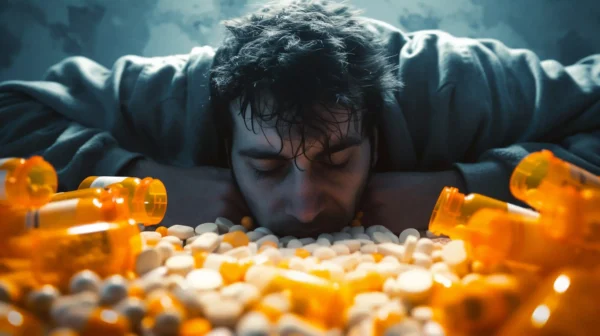- Understanding Fentanyl Dependency
- How Long Does it Take to Detox From Fentanyl?
- Fentanyl Withdrawal: How Long It Lasts and What to Expect
- The Importance of Support and Therapy in Recovery
- Medication-Assisted Treatment (MAT): An Aid to Fentanyl Recovery
- Creating a Personalized Recovery Plan
- The Long-Term Effects of Fentanyl Use
- Staying Committed: Overcoming Triggers and Preventing Relapse
- Conclusion
Fentanyl is a powerful synthetic opioid, often prescribed to manage severe pain but also commonly associated with addiction and misuse. For those struggling with fentanyl dependency, embarking on a journey to recovery can be daunting. Understanding how to get off fentanyl is a crucial step toward reclaiming control over your life. This post covers what to expect in the detox process, withdrawal symptoms, and effective methods to achieve a successful recovery.
Understanding Fentanyl Dependency
Fentanyl’s potency makes it one of the most addictive substances available, sometimes even leading individuals to dependency after a short period of use. The addiction can quickly spiral out of control, impacting all aspects of life. Recognizing the signs of fentanyl use is the first step to addressing the issue, whether for yourself or a loved one. Symptoms of fentanyl use can include sedation, confusion, and respiratory issues, but one of the more visible indicators in individuals is often a distinctive body posture — frequently bending over or slumping forward due to the drug’s sedative effects.
Breaking the cycle of addiction requires professional guidance, support, and a comprehensive treatment approach. Although the journey to get off fentanyl can be challenging, many resources and recovery programs exist to help.
How Long Does it Take to Detox From Fentanyl?
Detoxification, or detox, is the process by which fentanyl is removed from the body. This step is essential but can be one of the hardest parts of learning how to get off fentanyl due to the severe withdrawal symptoms involved. One of the most common questions asked is: how long does it take to detox from fentanyl? The answer varies based on factors like the length and intensity of use, physical health, and any underlying mental health conditions. In general, the detox process can last between a few days to two weeks, with the most intense symptoms appearing within the first few days.
Since fentanyl is a potent opioid, many professionals recommend a medically supervised detox to help manage symptoms and prevent dangerous side effects. Medications and therapies are often provided to ease withdrawal symptoms, making the detox process safer and more tolerable.
Fentanyl Withdrawal: How Long It Lasts and What to Expect
One of the main challenges when trying to get off fentanyl is dealing with withdrawal symptoms, which can be severe and long-lasting. How long does fentanyl withdrawal last? The answer depends on various factors, but most symptoms peak within the first week and can continue to subside over the next few weeks. Withdrawal symptoms typically include:
- Intense cravings for fentanyl
- Muscle and joint pain
- Nausea and vomiting
- Anxiety, depression, and mood swings
- Insomnia and restlessness
Some individuals may also experience Post-Acute Withdrawal Syndrome (PAWS), where psychological symptoms linger for months. Although PAWS can make the process of getting off fentanyl more challenging, support from medical professionals and therapy can help manage these symptoms over time.
The Importance of Support and Therapy in Recovery
Support and therapy are crucial components of learning how to get off fentanyl effectively. In addition to detox, behavioral therapies help address the underlying issues that may contribute to addiction. Cognitive-behavioral therapy (CBT) is especially effective in helping people understand their triggers and develop healthier coping mechanisms.
Group therapy and peer support groups provide a sense of community and accountability, which can be instrumental in recovery. When individuals hear others’ stories and share their own experiences, it can reinforce their commitment to getting off fentanyl and staying drug-free. Recovery coaches or addiction specialists are also valuable resources, providing both encouragement and professional insight as individuals work through the recovery journey.
Medication-Assisted Treatment (MAT): An Aid to Fentanyl Recovery
For many people looking to get off fentanyl, Medication-Assisted Treatment (MAT) can offer a safer and more manageable way to transition to sobriety. MAT involves the use of FDA-approved medications like methadone, buprenorphine, or naltrexone, which help to stabilize brain chemistry, relieve withdrawal symptoms, and reduce cravings.
MAT should only be undertaken with the guidance of a qualified medical provider, as these medications require careful dosing and monitoring. While not a standalone cure for addiction, MAT can be a valuable tool in the overall recovery plan, allowing individuals to manage the physical aspects of fentanyl dependency while focusing on behavioral and psychological aspects of recovery.
Creating a Personalized Recovery Plan
No two journeys to get off fentanyl are exactly alike, and recovery plans should be customized to each individual’s needs. In creating a recovery plan, factors like mental health, physical health, family support, and personal goals are all considered. A comprehensive plan often includes a mix of medical treatments, counseling, and lifestyle changes designed to support long-term sobriety.
A structured recovery plan helps individuals navigate the physical and mental hurdles of detox and withdrawal. It also provides a roadmap for achieving and maintaining sobriety, setting realistic, achievable goals. Whether it’s managing stress through exercise or learning new coping mechanisms for daily life, every element of the plan plays a role in the journey of getting off fentanyl.
The Long-Term Effects of Fentanyl Use
Understanding the long-term effects of fentanyl use can motivate those struggling with addiction to take steps toward recovery. Fentanyl use not only impacts the physical body but also alters brain function, often leading to a diminished ability to feel pleasure, motivation, or contentment without the drug. This can lead people into a cycle of dependency that can feel impossible to escape.
One of the more peculiar aspects associated with fentanyl is its impact on posture, often leading individuals to bend over. This body language is symptomatic of the drug’s sedative properties, which slow down the central nervous system, causing an unusual slumping or bending posture among users. Additionally, while fentanyl itself doesn’t have a distinct smell, the substances it is mixed with can produce a noticeable chemical scent.
Breaking free from the grip of fentanyl is challenging, but focusing on the benefits of recovery — improved physical health, mental clarity, and a restored sense of control — can be a powerful motivator.
Staying Committed: Overcoming Triggers and Preventing Relapse
After learning how to get off fentanyl and completing detox, the next phase involves maintaining sobriety. Relapse prevention requires identifying triggers, understanding risk factors, and developing a strategy for avoiding situations that could lead to drug use. Regular therapy, support groups, and, in some cases, sober living environments can be essential in reinforcing a drug-free lifestyle.
Relapse can be a part of the recovery journey, but it doesn’t signify failure. If relapse occurs, it’s important to seek support immediately and to resume the path toward recovery without judgment. Relapse prevention strategies are a critical part of a recovery plan and help individuals recognize the warning signs of potential relapse, allowing them to seek help before a return to substance use.
Conclusion
Getting off fentanyl is an achievable goal, but it requires a deep commitment to change and the support of healthcare professionals and loved ones. From understanding the detox process and withdrawal symptoms to recognizing the importance of support and medication-assisted treatment, each step in this journey is essential to reclaiming a drug-free life. If you or someone you know is struggling with fentanyl addiction, take the first step today. Learn more about available resources, explore recovery options, and remember that a brighter, healthier future is possible.
For more insights on overcoming addiction and building a fulfilling life in recovery, continue browsing our blog and discovering stories and strategies that may inspire you or a loved one to take the next step.




